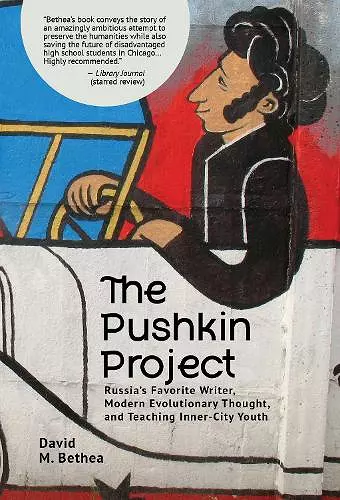The Pushkin Project
Russia's Favorite Writer, Modern Evolutionary Thought, and Teaching Inner-City Youth
Format:Hardback
Publisher:Academic Studies Press
Published:12th Oct '23
£98.99
Supplier delay - available to order, but may take longer than usual.

“Bethea’s book conveys the story of an amazingly ambitious attempt to preserve the humanities while also saving the future of disadvantaged high school students in Chicago. … Highly recommended.” — Library Journal (starred review)
The Pushkin Project tells the story of how a Russian studies professor changes course late in his career by reeducating himself in evolutionary thought and founding a summer institute that partners with inner-city high schools to implement a new set of learning strategies for underserved youth.These “cognitive cross-training” strategies involve introducing students from Hispanic and Black neighborhoods in the west and south sides of Chicago to the Russian culture and language, with an emphasis on poet, playwright, and novelist Alexander Pushkin. Through the lens of modern evolutionary thought, students adopt not only a new and different language and culture, but also a different sort of literary hero, one whose African heritage within the majority culture speaks to them directly. This inspiring and compelling story provides fascinating insights into Russia's national poet, brings the sciences and humanities together, and provides new directions in teaching young people from historically disadvantaged backgrounds.
“The Pushkin Project is both an inspiring memoir of Bethea’s work building an educational program for children from underprivileged communities and a remarkable essay on literature and evolutionary thought. At the center of it all are Bethea’s captivating readings of Pushkin’s classic works, in the form of lesson plans that will be useful to educators in any high school or university. Written in an engaging manner, probing deep questions of cultural history and educational philosophy, this is a book that effortlessly and gracefully appeals to multiple audiences.”
— Kevin M. F. Platt, Professor of Comparative Literature and Russian and East European Studies, The University of Pennsylvania
“A brilliant, multifaceted, and completely original book about how a distinguished professor of Russian literature decided to retool his pedagogy in accordance with the latest findings in evolutionary and cognitive science to teach Russian language and literature to underserved, minority, inner-city high school students. Bethea’s generous goal was to allow them to have the same powerful, life-altering experience he did when he learned Russian—a language with which he had been completely unfamiliar—and discovered that it revealed a new world and ‘added a different gear’ to his brain. In light of today’s debates about ‘cultural appropriation,’ the decade-long success of Bethea’s initiative is especially noteworthy because it demonstrates the necessity of deep engagement with cultural alterity to achieve optimal personal growth. Part memoir, part bridge between Snow’s ‘two cultures,’ part paean to the enduring genius of Russia’s national writer, Alexander Pushkin, this is an essential book for our times.”
— Vladimir Alexandrov, B. E. Bensinger Professor Emeritus of Slavic Languages and Literatures, Yale University
“A fascinating account of how, in teaching Pushkin, one might also teach students to think about citizenship, risk, evolutionary neuroscience, and language itself. Exemplary readings of major texts are embedded in this book, which is pedagogical in multiple ways. I envy David Bethea the chance to have learned so much from students in the Pushkin Project.”
— Stephanie Sandler, Harvard University
“This book is testimony to an astonishing hybrid. On one side Alexander Pushkin, Russia’s foundational poet of genius and an octoroon; on the other, an American professor and born teacher who devotes a decade of his life to making Russian culture inspirational for young people from minority backgrounds. Prompted by creative visions as vast as those of Charles Darwin and Iain McGilchrist, all the while urging us on with his trademark faith in ‘co-evolutionary spirals’ that pit literature against despair, David Bethea, in this very bad time for our Russian brand, has given us a moving memoir of poetry, sociobiology, civic conscience, and pastoral care.”
— Caryl Emerson, Princeton University
“David Bethea has combined his love of Pushkin and the Russian language with his knowledge of evolutionary biology and his deep reading in other areas to devise an educational project unlike any other. The Pushkin project is unique and is dedicated to helping Black and Brown teenagers learn about another language, another culture, and a different way of seeing the world. I highly recommend it.”
— Henry L. Roediger, III Professor of Psychology at Washington University in St. Louis and co-author of Make It Stick: The Science of Successful Learning
“Such a lucid and immersive narrative about a most improbable and imaginative project! I learned so much about Pushkin and inner-city culture, and the evolutionary drumbeat resonated throughout. Bravo to David Bethea, his adventurous students, and their fascinating encounters with poetry and transcendence.”
— Ursula Goodenough, Washington University; author of The Sacred Depths of Nature: How Life Has Emerged and Evolved
“This book is the best news for the field. It mixes eye-opening readings of Pushkin through the lens of evolutionary biology with something that is constantly, but I dare say especially currently, much in demand: a sense of purpose. In engaging and subtle prose, Bethea tells the story of the experience teaching Pushkin to students from Black and Brown communities, and in doing so, reminds us that the opportunity to turn our studies into something meaningful—not just for us but also for the people around us—is always at hand.”
— Daria Khitrova, Associate Professor of Slavic Languages and Literatures, Harvard University
ISBN: 9798887192017
Dimensions: 228mm x 152mm x 19mm
Weight: 553g
260 pages